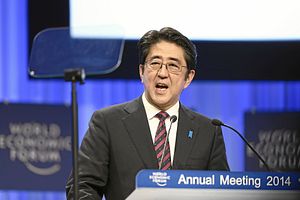Finally, after many days of wrangling in the Japanese Diet and huge protests by naysayers outside, early on Saturday morning, the Upper House of the Diet passed a new package of security bills that mark a significant departure from Japan’s pacifist posture in the post-World War II era.
The opposition benches tried every trick in the book, including by submitting a series of censure motions and a no-confidence motion against the Abe cabinet, but they were all voted down. Finally, the bills were passed with 148 votes in favor and 90 votes against. The ruling Liberal Democratic Party (LDP) and its coalition partner Komeito enjoy a majority in both the lower and upper houses of the Japanese Parliament. They had also secured the support of three other smaller parties after the Abe government agreed to concede a greater say for the Diet in determining when the Self-Defense Forces (SDF) can be deployed overseas.
The LDP-Komeito alliance had another option of using the ’60-day rule’ under which the lower house could pass the bills with a two-thirds majority in the case that the Upper House did not put these bills to a vote within 60 days of them being passed by the lower house. These bills were cleared by the lower house earlier in July this year.
What does this mean for Japan’s security outlook?
First, the laws mean that Japan’s SDF can now come to the aid of the United States and other friendly nations in case of an armed attack against them, even if Japan is not directly under attack. It also means that SDF forces would now be able to legally participate more actively in peacekeeping operations across the world under the banner of the United Nations.
Second, Japan will now play a bigger role in taking up security responsibilities under the U.S.-Japan alliance. Under the terms of the U.S.-Japan security treaty, the U.S. is obliged to protect Japan in case it comes under attack, but the alliance has never worked in the other direction. During his visit to the U.S. earlier this year, Abe had promised that he would repeal the older laws governing the deployment of SDF troops overseas in support of the U.S. and other friendly countries. Abe has been under pressure to have Japan do more in the U.S.-Japan alliance as financial concerns grow in the U.S. over defense spending and, in the event of a change to a Republican president in the U.S., things are going to get tougher for Japan when it comes to the U.S.-Japan alliance.
Third, the laws could mean an increase in heated rhetoric between Japan and China with regard to their disputed territorial claims in the East China Sea. Earlier this month, China conducted its “Victory Day” parade to commemorate Japan’s defeat in the Second World War with a massive display of military firepower. Interestingly, South Korean President Park Geun-hye also attended the parade, although Japan and South Korea are both staunch U.S. allies. This shows that Seoul is slowly but surely warming up to Beijing. Diplomatic tensions in Northeast Asia are likely to rise.
Criticism
Critics argue that the laws could lead to Japanese troops being caught up in battles on behalf of the United States on distant shores. There were huge demonstrations outside the Japanese Diet on a scale not witnessed in recent times. Approval ratings for the Abe government have taken a hit and it will be a significant task for the prime minister to win back public support. There have been months of protests over these security bills, which some academics and observers have described as “unconstitutional.” The laws could be challenged in court.
Meaning for Japan
The new laws mean that Japan has forever dumped the restrictions governing SDF operations outside the country. For Abe, the passage of these bills must be doubly sweet since huge public opposition had brought down the government of his grandfather, Nobusuke Kishi, fifty-five years ago, when he tried to revamp the U.S.-Japan Mutual Security Treaty.
Abe now has his task clearly cut out: he needs to devote his full attention to the sluggish economy or risk a further dip in his approval ratings and those of his government. The protests over the security bills have resulted in the birth of a new politically aware young generation in Japan, which is a novel development since, for long, many have complained that the young generation in Japan had very little interest in politics.
It is this generation which is now likely to keep Abe and his cabinet on their toes.
Rupakjyoti Borah is currently a Visiting Scholar based at the National Chung Hsing University in Taiwan and a Special Research Fellow with the Japan Forum for Strategic Studies. The views expressed are personal. Follow him on Twitter at @rupakj.

































